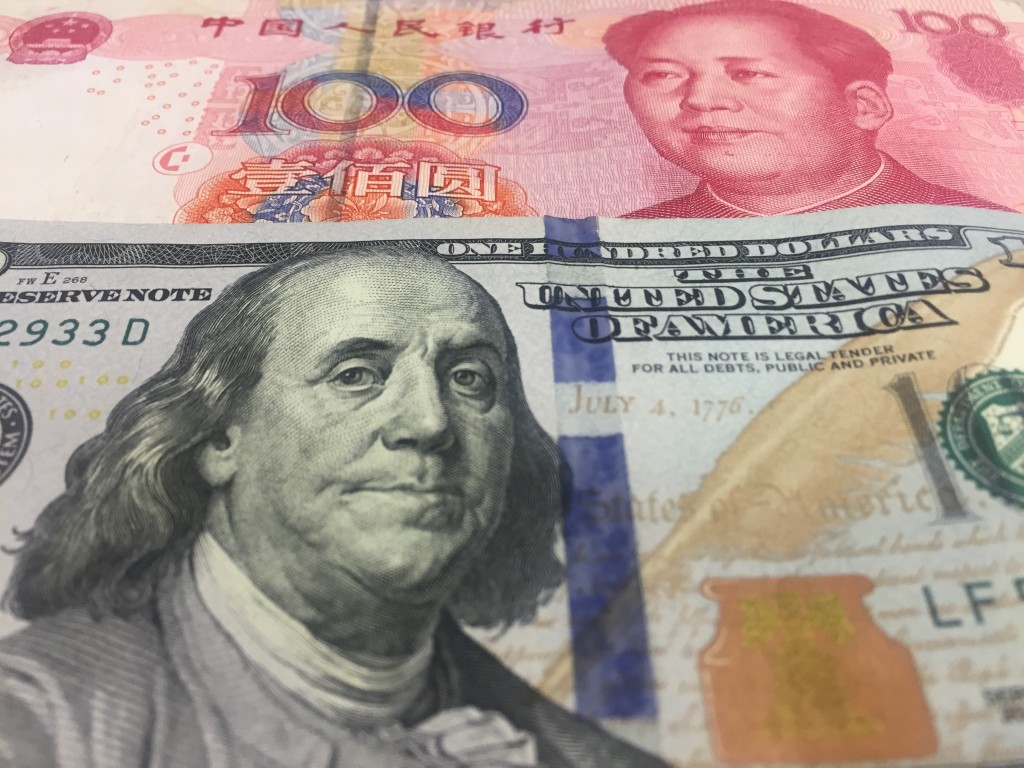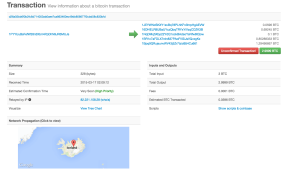
China wants its currency to play a more significant role in world affairs. Can it challenge the dollar? (Lei Xuan / Medill News Service)
WASHINGTON – The International Monetary Fund is currently assessing whether the Chinese yuan — also called renminbi – has met the standards to be included in its Special Drawing Rights basket. China says such inclusion would allow its currency to play a more significant role in world affairs and is anxiously awaiting the result.
Di Dongsheng, a visiting Chinese scholar to Georgetown University, first heard that the yuan was not likely to be included when he attended the IMF spring meetings in April. However, two weeks later, he learned that its chance for inclusion was much improved.
Di wrote an informal report to his friends in Beijing, some of whom work for the Chinese government. “They are interested in the issue,” Di said.
The SDR basket currently includes dollar, yen, euro and British pound. According to the IMF, the SDR is not a currency. It can only be exchanged among IMF member countries and can’t be traded in the financial market.
The value of the SDR is determined daily by the IMF on the basis of the componential currencies, instead of being directly determined by the supply and demand of the market.
When there is not enough liquidity, the SDR can be exchanged to freely usable currencies to balance a country’s account.
The IMF says it adjusts the basket every five years to reflect “the relative importance of currencies in the world’s trading and financial systems.” In 2010, the yuan was declined to be included due to it didn’t meet the requirement of being “freely usable.”
If approved this year, the yuan would be recognized as the world’s fifth reserve currency, and its international role would be elevated.
The Chinese authorities “have expressed a very strong interest in inclusion in the SDR basket,” said IMF Deputy Spokesman William Murray. “This expression of interest is being taken very seriously by the IMF.”
The IMF is taking “very active analysis” to review China’s request to include the yuan in the fund’s SDR basket, according to Murray when answering a question from Medill News Service.
David Dollar, a senior fellow with the Foreign Policy and Global Economy and Development programs of the Brookings Institution, said inclusion of the yuan in the SDR basket is “largely symbolic, because it doesn’t have that much practical implication.”
“But it would be a signal that Chinese yuan is now one of the five main currencies in the world,” Dollar said in an interview.
The IMF executive board will hold a formal review at the end of the year. Inclusion of the yuan needs at least 70 percent of voting shares from IMF member countries. If the IMF decides the inclusion is “a fundamental change,” it would require 85 percent voting shares. The U.S. alone holds 16.74 percent of voting rights, which means the U.S. has the veto power.
The U.S. has long accused China of manipulating the yuan and urging it to achieve a market-based exchange rate. And a disagreement on the yuan between the IMF and the U.S. would cast doubts on whether it could join the world’s reserve currency club.
In an annual Chinese economy review statement recently, the IMF said the yuan is no longer undervalued.
However, the U.S. disagreed. “We continue to think it’s undervalued,” Secretary of Treasury Jack Lew said last week during a dialogue in London.
Lew said the U.S. has urged China to open its currency and have “a market-determined exchange rate that makes it freely convertible.”
“They still get some work to do moving on that path,” said Lew, who pushes China to continue its reforms, although he also said China has made a lot of progress.
“I think that [the reform] is heavily in China’s external economic interest. It’s in global economic interest and it’s in the U.S. economic interest,” Lew said.
“The U.S. is still quite conservative on the SDR issue,” said an economist who works for the Chinese government, speaking on the condition of anonymity because she was not allowed to talk to media without permission. “China still faces resistance,” she said.
She added that she thought the U.S. is cautious about any possible change of the current financial system.
“I cannot speculate what the U.S. government is going to say on this,” said Gian Maria Milesi-Ferretti, a deputy head of World Economic Outlook in the Research Department at the IMF in an interview. “It is a review done by the IMF, and we’ll see what the executive board will decide.”
Yangcheng Evening News, one of the leading newspapers in South China, called the SDR issue a “new fight” after the Asian Infrastructure Investment Bank in the current financial system between China and the U.S.
Traditional U.S. allies include the U.K. and Australia all joined the AIIB, whereas the U.S. and Japan chose to stay out of the China-backed investment bank.
The Chinese newspaper said, on the SDR issue, the “opposition” from the U.S. was due to the fact that the increasing demand of the yuan from central banks would possibly pose a threat to America’s dominance in the global political economy.
“Other currencies that included in the SDR are all important reserve currencies,” said Dollar, “(but) none of them have challenged the dollar as a primary reserve currency. I think it would take a long time for the Chinese yuan to compete with the dollar to be a primary reserve currency.”
Dollar said he is “cautiously optimistic” to see the Chinese yuan being included in the SDR this year.
“The U.S. and China will discuss this in the Strategic and Economic Dialogue in Washington (in June). (China’s) President Xi Jinping will visit Washington in September. So I think there is a pretty good chance that the Chinese yuan will be included in the SDR this year,” he said.
“You cannot decree that a currency will be an important international currency. The market determines that,” said Edwin Truman, nonresident senior fellow at the Peterson Institute for International Economics.
According to the IMF, at the end of 2014, 62.9 percent of international reserves among global central banks were U.S. dollars. An HSBC survey of global reserve managers showed that they expected the yuan to become the world’s second largest reserve currency by taking a 12.5 percent market share in 2030, though it would still fall behind the dollar.
While the SDR does not directly reflect the needs from the market, it only has a symbolic meaning. However, using the SDR as a substitutable reserve currency of the dollar would be another issue.
Back in 2009, China’s central bank Governor Zhou Xiaochuan advocated a new international reserve currency in an article.
“The desirable goal of reforming the international monetary system,” Zhou wrote, hinting that the dollar should be replace, “is to create an international reserve currency that is disconnected from individual nations and is able to remain stable in the long run.”
President Barack Obama dismissed the need to replace the U.S. dollar shortly after Zhou’s article.
Dollar, the economist, said he doesn’t see any big changes coming anytime soon.
“I don’t think there is any follow-up about that discussion,” said Dollar. “Right now the dollar is the premium reserve currency. I don’t think that is going to change in the next few decades.”







